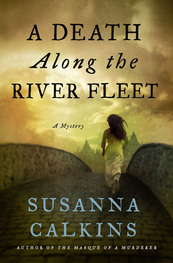 When I first began to conceive of A DEATH ALONG THE RIVER FLEET (to be released April 12, 2016!), an image came to me that ultimately informed the entire novel. That image was of a young woman, barefoot and clad only in her shift, stumbling at dawn through the rubble left by the Great Fire of 1666 (and yes, I am counting down to the 350th anniversary of the Great Fire! See counter to the right!) And, of course, I needed her to run into Lucy, so that my intrepid chambermaid-turned-printer's apprentice would have a reason to be involved in the mystery that follows. But it took me a while to figure out exactly where this encounter could reasonably occur. I thought at first the woman could be found on London Bridge. And I really wanted to write something about how the impaled heads of traitors, which lined either side of the Bridge, had caught fire. After all, in Annus Mirabilis Dryden had described in macabre detail how sparks had scorched the heads: "The ghosts of traitors from the Bridge descend, But then when I did a little more digging, I discovered that London Bridge had been damaged in the Fire, and really was not much of a thoroughfare in the months that followed the blaze. Indeed, there would have been no good reason for Lucy to be traveling in that direction, particularly so early in the morning. So I realized that, first, I needed to think through what Lucy was doing out of Master Aubrey's house, just before dawn. Not too hard to figure out actually. She needed to be delivering books. But then the question became, in what direction did she need to travel to deliver those books? Most people were living to the west of where the Fire had stopped. So why would she be going into the wasteland at all? To figure out this challenge, I began to systematically create a large scale map of Lucy's London using photocopies of reconstructed maps of the period. As I marked in red the burnt out area of London, I realized that the Fire line had been stopped to the west along the River Fleet. The River Fleet? This was not a river I knew anything about. A vague recollection that the Romans had used the river to transport goods, but I couldn't remember ever hearing about it otherwise. I became even more curious when I saw that several bridges, including the Fleet Bridge and Holborn Bridge, crossed it. Clearly, the river was wide enough or significant enough to require actual bridges, so it couldn't just be a stream. Intrigued, I began to read more about this mysterious river. From the maps I could see that the river flowed from the north, went through the Smithfield butcher markets, traversed Fleet Street, and emptied into the Thames. There was also a region that surrounded it, awesomely called "Fleet Ditch." [Sidenote: I really wanted my book to be called "Murder at Fleet Ditch," but that title didn't even make it past my editor. A little too stark, I guess.] 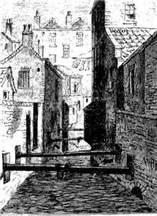 By all accounts, by the 17th century, the River Fleet was no longer a river where boats could easily travel, but had instead become a place where people would dump animal parts, excrement, and general household waste. Indeed, Walter George Bill, one of the great original historians of the Great Fire, described the River Fleet as an "uncovered sewer of outrageous filthiness." And yet, there were still accounts of people bathing in its waters (yuck) and even drinking from it (yuck, yuck, double yuck), despite its considerable stench and grossness. 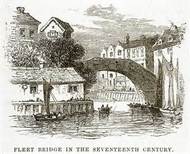 So the River Fleet--and the original bridges that crossed it--formed a natural backdrop for my story. I could not find a picture of the 17th century Holborn Bridge, but I thought this artist's rendering of Fleet Bridge might serve as a model. And because the Holborn Bridge was still in place after the Fire, with the unburnt area and markets on one side, and the burnt out area on the other, it became the perfect place for Lucy to encounter this desperate woman. 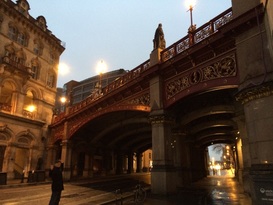 My friend Greg at modern Holborn Bridge... My friend Greg at modern Holborn Bridge... But of course, I was still curious...is there still a River Fleet? The answer is, yes, of course, but it was finally bricked over in the 1730s, after being declared a public menace. It was still problematic though, particularly in the 19th century, when a great explosion occurred as a result of the expanding gasses in the pipes below the streets. Raw sewage apparently spilled everywhere!!! (Don't even think I wouldn't use that awesome detail if I ever set a book in 19th century London. But I doubt it would make it to the cover!) And if you want to know more, here is a nice overview of the history of the River Fleet in all its--ahem--glory.
8 Comments
Erlene Kimber
2/20/2016 02:32:21 pm
I just discovered your novels at my local library. Having read the first two, I am looking forward to the next two.
Reply
2/21/2016 10:31:25 pm
Eriene, Thank you very much! I appreciate your kind words. I enjoy Anne Perry and Elizabeth Peter's works too! In fact, I wrote about the first time I met Anne on this post: http://www.susannacalkins.com/blog/youve-got-to-be-kidding-me-im-on-a-panel-withwho-no-way
Reply
Murielle
2/27/2016 10:04:49 pm
Hello!
Reply
HI Murielle, Thank you so much! I really appreciate it! If you read this story of my first book, you'll see that A Murder at Rosamund's Gate started as a "hobby" too (http://www.susannacalkins.com/blog/after-a-very-long-journey-my-book-has-arrived) Maybe I'll write a post about this at some point, but for now I'd say, just go to your local library and look through books on Charles II and the Restoration. I recommend that you try to get the broad strokes down first--get a handle on (1) Who Charles II was and how he was restored to the throne; (2) the political fragmentation that followed the English Civil wars--after all Parliament and Royal forces were essentially fighting one another (3) the tensions between the high and low Anglican Church, as well as widespread negative attitudes towards Catholics. Think too, about the religious fragmentation that has occurred--in the 1640s and 1650s there was the emergence of the levelers, the diggers, the ranters, the Quakers, who were all challenging (and being challenged by) the authority of church and crown (the persecution of witches fits in here) and (4) the reinstatement of everything that the Puritans had abolished--how Charles II restored music, theater, and general merry-making. Then of course the devastation caused by the plague and Fire caused great impact as well. Trying to get a handle on these things might help you get started.
Reply
Murielle
2/29/2016 09:41:30 pm
Susanna,
Murielle
2/29/2016 09:47:36 pm
P.S. Read the blog entry you linked me to. This might sound weird but looking over murder ballads sounds really cool! Did you get to see the actual broadsheets or copies? Either way, so cool!
Reply
Yes, I've seen some real ones at the Newberry Library, the British Library and the Friends Library in London. But I usually just read electronic copies (scanned)--they can be found in a wonderful collection of materials called the Early English Books Online. Best of luck in your writing; enjoy the process!!!
Reply
Murielle, I definitely don't want this to sound overwhelming. Most books that are just called something general like Restoration England will probably just offer chapters on each of these topics. If you are able to get to a library, I'm sure a librarian can help you find a book that covers these big themes. So not to worry. I will try to answer your question in a different way when I get a chance; there is another way to think about doing this research. But of course, anyone who aspires to a historical novel will have to do a little bit of reading to situate themselves appropriately.
Reply
Leave a Reply. |
Susanna CalkinsHistorian. Mystery writer. Researcher. Teacher. Occasional blogger. Categories
All
Archives
May 2023
|
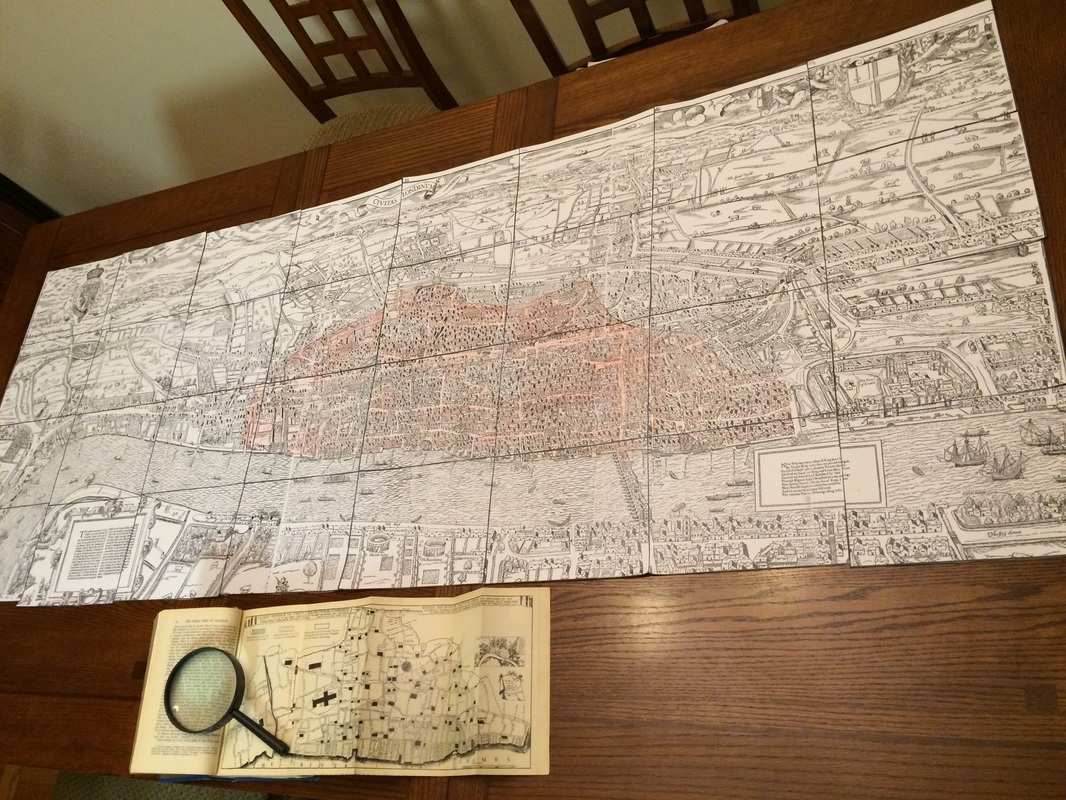
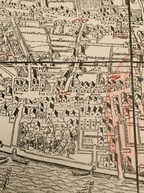
 RSS Feed
RSS Feed